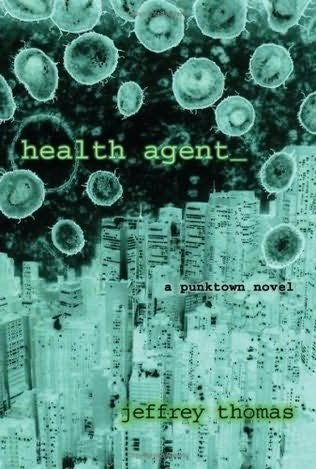 by Joshua Palmatier/Benjamin Tate
by Joshua Palmatier/Benjamin Tate
First, I’d like to thank Disquieting Visions for having me guest post on their blog. I’m honored, and hope I offer up something interesting for their readers. My name is Benjamin Tate and I’m an author with DAW Books. At the moment, my first novel WELL OF SORROWS is on the shelves and ready to be read and (hopefully) enjoyed by all. The sequel, LEAVES OF FLAME, has already been written and is in the publishing pipeline, with an expected release date in early 2012 (say January or February). The third novel in the trilogy—and yes, there will ONLY be three books in this trilogy—is tentatively titled BREATH OF HEAVEN and should be out sometime in 2013. I also have a short story out there: “An Alewife in Kish” is in AFTER HOURS: TALES FROM THE UR-BAR.
But I’m not just Benjamin Tate. I’m also Joshua Palmatier, DAW Books author. Joshua has three books out at the moment, a complete trilogy titled the Throne of Amenkor, containing the books THE SKEWED THRONE, THE CRACKED THRONE, and THE VACANT THRONE. Joshua also has some short stories on the shelf: “Mastihooba” in CLOSE ENCOUNTERS OF THE URBAN KIND and “Tears of Blood” in BEAUTY HAS HER WAY.
When people find out I have a pseudonym (Benjamin Tate), they invariably want to know why, so I figured I’d address that issue here. There are many reasons to use a pseudonym (and I certainly can’t cover them all), but in the end they almost always come down to marketing in one aspect or another. You see, the publisher is out to sell books. They are trying to find the best way to get the book from the shelf into the reader’s hands, and from there, home. The author wants this as well, although usually their focus is to get the reader to actually READ the book once they get it home. After all, we want you to enjoy what we’ve spent so much time working on. But the reader won’t enjoy the words unless they pick up the book, so marketing is important. And there are two ways to get the book from the shelf into a reader’s hands: the cover art and the name.
The cover art is an entire post on its own, so we’ll focus on the name. For any writer, we’re trying to build up an audience—a group of core readers—who will pick up the book simply because it has our name on it. For example, I pick up every Stephen King book, no matter what the cover art is like, simply because it’s Stephen King. I want my readers to do the same thing. The publisher wants the readers to do the same thing.
So my first books came out under my real name Joshua Palmatier. They sold fairly well, but obviously didn’t explode off the shelf and onto the bestseller lists. If they had, I wouldn’t be writing this post. *grin* Joshua built up a fairly good audience, but when it came time for the beginning of the next trilogy, my publisher approached me with the idea of using a pseudonym. Pseudonyms have been used in the past to great effect for many reasons—when an author switches genre, when they switch from adult fantasy to young adult or vice versa, etc. Here, the idea was to attempt to get more of the new book onto the bookstore shelves by launching a “new” author. You see, bookstores generally use the sales of the previous book by an author as a baseline for how many of the new book to order, so if you sold 10 copies of the previous book, they order in, perhaps, 5 of the new book. This is called the “death spiral,” since the number of books ordered each time typically decreases. Joshua Palmatier was suffering from the death spiral. If the new book was launched under a new name, Benjamin Tate, then the bookstore wouldn’t have any backlist to check, and so would order more copies of the book. More books on the shelf means more book sales, since you’re more likely to buy a book if you have it in hand. That’s the theory anyway.
There’s a downside to using a pseudonym of course. Basically, as an author, you’re starting out from scratch with the new name. You can’t expect the audience that you built up under the first name to be aware of the fact that you’ve changed names. I’ve tried to let all of the Joshua Palmatier fans know that I’m now being published under the name Benjamin Tate—it’s on my webpage (www.joshuapalmatier.com), I announced I on my blog (jpsorrow.livejournal.com), put it on my Facebook page, etc. But recently, at a reading at the World Fantasy Convention, I discovered that at least half of the audience had no idea I was using a different name now. I’m sure there’s someone reading this blog right now who is finding this out for the first time. But it was agreed that the chance of increasing the audience was worth the risk of switching names. So it was done. Did it work? I have no idea. It’s too early to tell.
As a counter to what’s happened here in the United States, the German translations of the Throne of Amenkor books (DIE ASSASSINE, DIE REGENTIN, and DIE KAEMPFERIN) have garnered enough of an audience that the publisher over there is now interested in the new series . . . but only if they can publish them under the name Joshua Palmatier. So there, the audience was large enough that the reasons for using a pseudonym are obsolete.
So that’s what’s in a name . . . or at least what’s in my name. Or names. Whatever. I’m searching for that audience, the one that will buy my books no matter what. Are you part of my audience? Check out some of my books or short stories to find out.
You can listen to the audio from when Benjamin was a guest of Blog Host, Gail Z. Martin’s Ghost in the Machine podcast here: https://www.audioacrobat.com/play/W6zFv1l7














